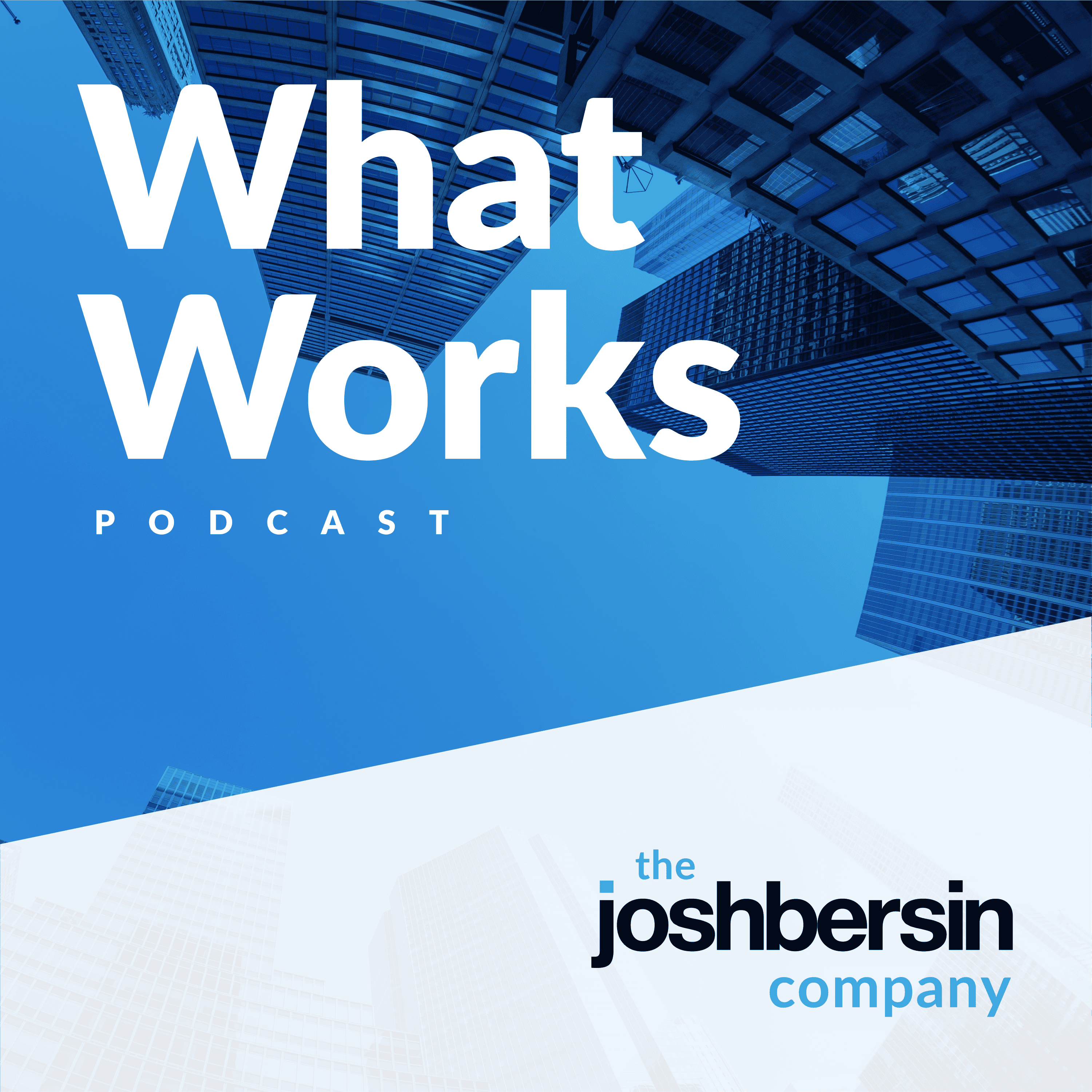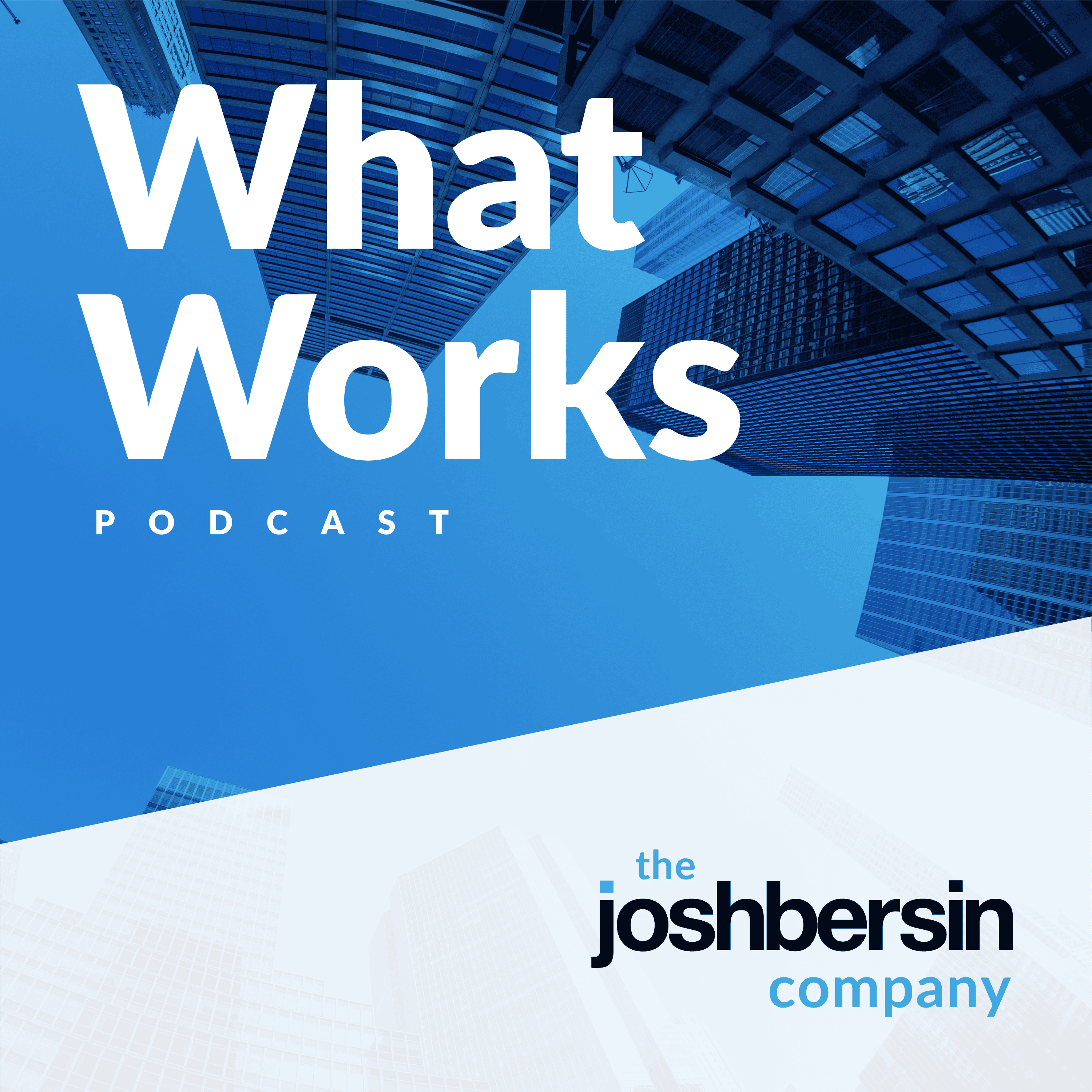Episode Transcript
Speaker 1 00:00:01 Hi, this is Josh person. Welcome to Research-Based Perspectives on the ever-Changing World of Work, leadership, learning, and HR with a heavy dose of insights on the exciting world of HR technology.
Speaker 1 00:00:22 Hi everyone. Today I'd like to talk a little bit about resilience, which is a very hot topic in the pandemic and going forward, and just give you a few things to think about. The first is, there's really two sides to resilience. There's organizational resilience. How quickly can your company react and respond and adapt and transform? And then there's individual re resilience. How well can the people, as individuals or leaders, uh, adapt to the changes that are taking place? And let me talk about both of them just for a couple minutes. Organizational resilience, it turns out, is a very, very complex topic and it relates to everything from agile, innovation, creativity, how quickly we can adopt new ideas to responsiveness. When we have a crisis like we have now, how quickly can we respond and how locally can we respond? And if you look at the military who's studied organizational resilience quite well, they've pretty much nailed it.
Speaker 1 00:01:25 And what they've decided and discovered is that in order to be resilient as an organization, you need to have what is called a sociotechnical system. In other words, we need to have great data and great communications. So we're all operating on the same playbook and we have a sense of shared awareness, but we also have to know each other as humans, we have to have relationships with each other. So as when things come up, we know who to call and we have, um, a, a good sense in our mind as to who the people are that will help solve a problem. The second thing that comes up in organizational resilience is capabilities, skills. If you have people on the front lines who don't know their jobs, if you have people in engineering who don't know the new tech, if you have people in marketing that don't know the market, you're not gonna be very resilient.
Speaker 1 00:02:14 You're gonna find yourself recovering and trying to adapt more quickly. So capability development, uh, which I've spent a lot of time talking about is critical here. And that includes skilling, uh, job rotation, um, and what I call capability academies, a whole system of building skills. The third issue in organizational resilience is having a sense of empowerment. It turns out that in most companies, particularly now in the pandemic, the issues that resolve that need resolution are local. They aren't known in corporate. Um, we don't know what they are when we're sitting in New York City at the top of a skyscraper, but somebody in a, in a store or a plant or a manufacturing location or a hospital, they know. Um, and so we need to empower people and give them the authority to act locally in the framework and in the shared awareness that we create in the sociotechnical system.
Speaker 1 00:03:12 A good example of this is in hr. I've had a lot of companies over the years tell me that we wanna reduce the role of business partners and push more and more and more knowledge and information and decision making into the hands of line managers through, um, self-service. Well, that's all great and it's sort of makes perfect sense economically, but actually we need specialists close to the action. And so what we're finding now in the HR domain, and certainly in terms of your reorg of hr, which a lot of companies are going through, is the role of the business partner is more important than ever. Business partners have to make local decisions very, very quickly. For example, one of the retailers we talked with during the pandemic told me that the stores in Italy got shut down so quickly and everybody went home cuz there were no customers that the local business partners had to set up business practices to send people home and shut down the stores and deal with customers, uh, in Italy before the rest of the world or the corporate people had any idea that the pandemic was starting.
Speaker 1 00:04:19 And they happened to have very senior people there and they were very highly empowered. But that's why this sense of empowerment and um, in a shared awareness environment is so important. The final point of course in resilience, organizational resilience is data. Having high quality data, um, you're gonna be making decisions a lot, especially during the pandemic, but even in a regular business cycle. And when the data is unclear, untrusted, um, we don't know what it means. We don't know where it came from, we don't know whether it's accurate. Those decisions can't be made and you're gonna stumble or you're not gonna make a decision at all. So those are all organizational resilience issues as well as creating a sense of safety in the individuals in the company so that they can stretch themselves, try new things, adapt, change the way they do their jobs and so forth.
Speaker 1 00:05:15 The second half of resilience is individual resilience, which is obviously the mirror image of this. It's great if the organization has all these great things going on about changing and adapting and innovating and growing. If the individuals can't keep up with it, it's not gonna happen. Well, individual resilience, as psychologists have studied is somewhat all about psychology. Do I feel safe? Am I protected? If I stretch my neck out and do something different, am I gonna get in trouble? If it doesn't work, am I gonna get punished? Um, are the rules clear on what I can and can't do and should and shouldn't do? And do I have a job that allows me to flex within those rules? Do I have a sense of optimism about where the company is going? Now, one of the things that's come up a lot during the pandemic is this enormous sense of mental, psycho psychological and physical stress that we're under.
Speaker 1 00:06:16 Most people are working a lot of hours right now. They're working from home. They're worried about their families, they're worried about their health. Uh, they're worried about just getting the right food to eat. And so we have to create a sense of safety in the individual environment so people feel that they can sort of push those lower levels of the Maslow's hierarchy aside and work at the higher levels on the more inspirational customer oriented things we need to do. Um, the final thing I'll say about individual resilience, uh, really goes back to some research we're doing in discussions we're doing with Marty Seligman from the, um, university of Pennsylvania who's really one of the fathers of positive psychology. You know, one of the things that creates resilience and adaptability in human beings is their sense of optimism about the future. You know, when there is a vision, when the CEO or the business leader or the boss gives you a sense of where we're going and we feel that it is a competent view of the future, it doesn't have to be perfect, but at least you know, we have some sense that it makes sense.
Speaker 1 00:07:22 We feel a little bit better, we feel more willing to try new things. We feel more flexible, we feel more supported. And so another, so the final point I'll just make on individual resilience is that, you know, a sense of positive optimism and a sense of joy. One of the things that, um, Marty talks a lot about in his discussions about, uh, positive psychology from the research he's done at the Army is that, you know, we need to give people a sense of joy, forgiveness, uh, reciprocity, a sense of curiosity. Awe, these are words that tend to come from psychology books or, you know, happiness websites. They actually play an enormously important role in business settings too, because when we don't have a sense of joy, if we feel like we're drudging our way through our job and our experience at work, or maybe our manager or our work situation, you know, we're not gonna be very resilient.
Speaker 1 00:08:19 We're not gonna be very flexible to change. We're not gonna deal with adversity very well. So anyway, there's a lot to go to talk about here. We are building a whole program in the JBA around this and a set of research about it. Uh, we will be getting Marty on video for some interesting things, and I encourage you to dig into the topic because it's a deep topic. I have a video on it in the YouTube channel, but join the Bur Academy and you can learn a lot more. It is, it is probably one of the most important leadership characteristics we have to focus on for the next, uh, year or so, and one that will eventually lead you into innovation and growth because it is the resilient companies that can create and invent and adapt to the ever-changing marketplace around them. Thank you very much.
Speaker 1 00:09:34 If you like what you heard, please join the Josh Burson Academy, the world's professional development academy for hr for less than a cost of a nice dinner in a town near you. You can have an entire year's access to hundreds of courses, articles, research studies, case studies, and an entire community of more than 10,000 HR professionals all collaborating with each other to help you learn and solve the problems in your particular company. We call the Burson Academy, the world's home for hr, and you'll find it to be one of the most important parts of your career and your company's HR strategy for the years ahead. Thank you.


